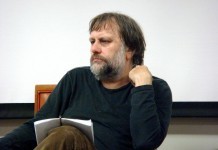Slavoj Žižek and Tariq Ramadan on Al Jazeera.
I think that [Blair’s] message was, if one can read between the lines, quite unambiguous… What they want is some changes that would allow the global situation to stay the same… You know how often in our multicultural era, where we’re all suspicious of universalism, we like to hear how democracy as we understand it is something specifically Western. You should understand, different cultures and so on and so on.
But, what affected me tremendously when I was not only looking at the general picture of Cairo, but listening to interviews with participants, protesters there, is how cheap, irrelevant all this multicultural talk becomes. There, where we are fighting a tyrant, we are all universalists. We are immediately solidary with each other. That’s how you build universal solidarity, not with some stupid Unesco multicutural respect. It’s the struggle for freedom. Here we have a direct proof that a) freedom is universal, and b) especially, proof against that cynical idea that somehow Muslim crowds prefer some kind of religiously fundamentalist dictatorship.
… What happened in Tunesia, what happens now in Egypt, its precisely this universal revolution for dignity, human rights, economic justice. This is Universalism at work. What we see daily in Egypt. One Egyptian protester said: „I‘am proud that I‘am Egyptian.“ I‘am proud for them! They gave us the lesson against this falsely respectful, but basically rascist prejudices. You know, ooh, Arabs have their specific culture, they cannot really get it. They got it! They understand democracy by doing what they are doing better than we do in the West. In Western Europe with our anti-immigrant parties and so on and so on. So I‘am proud for them.
Again, here is Universalism. This is the best argument that you can see on tv, against all that trash about ‘Clash of Civilizations’ and so on and so on. The Moment you fight tyrany we are solidary. No ‘Clash of Civilizations’! We know what we mean. No miscommunication here.
… it is crucial to have a strong left. Only this can save us.… In Tom and Jerry cartoons, you have often a scene when a cat walks, it walks over the precipice, and it’s nothing below its feet, but it doesn’t fall down. When it looks down, and it sees it has nothing below its feet, it falls down. Those in power must find themselves in such a situation in order to fall down. That’s where we should push Mubarak.
… If the true choice is between Muslim fundamentalism and Western liberalism we are lost. I think the true tragedy for the Arab nations is the disappearance of – not secular in the way of religious, but secular in the sense of secularity of its demands: justice, freedom, and so on, of this kind of a left: non fundamentalist – it can be Muslim – but non fundamentalist left. This to me is the true tragedy, and I think the rise of deplorable fundamentalism is strictly something that entered the stage, filing in this void of the left, and here I draw a much more radical conclusion: this is not just in Islamist countries – this can repeat itself again and again, for instance in Afghanistan. Its presented in Western media as a crazy fundamentalist country: sorry, I’m old enough to remember 40 years ago, Afghanistan was a very open, secularized country with a pro-Western, democratic model, strong local Communist Party. Then we know the story: Communists made the coup d’etat, Soviet Union intervened, America intervenes against.. It’s part of this process that Afghanistan was – if we use this awkward word – fundamentalized.

















Dobro. Dve poanti se mi zdita ključni. Prvič, da gre za univerzalen demokratičen dogodek – ki kaže, da je govor o tem, da je arabska (ali kitajska,…) kultura politično nekaj posebnega, v resnici prekrivanje. Pravzaprav dvojno prekrivanje: iz strani zahoda, ki v resnici ne želi demokracije v post-kolonialnem svetu, in iz strani avtokratskih režimov, ki svojo tiranijo prikazujejo kot kulturno posebnost. In drugič, da se v arabskem svetu odpira prostor onstran alternative ali islamizem ali zahodni liberalizem – prostor nečesa , kar oba opredelita kot temeljno zahtevo ljudstva po svobodi in pravičnosti. Torej neke temeljne zahteve, ki jih ljudstvo na… Beri dalje »
guardian.co.uk, 10 February 2011 20.30 GMT
Slavoj Žižek: For Egypt, this is the miracle of Tahrir Square
There is no room for compromise. Either the entire Mubarak edifice falls, or the uprising is betrayed
Komentar filozofa Petra Hallwarda: http://www.guardian.co.uk/commentisfree/2011/feb/22/arab-uprisings-world-order-middle-east "For many of these years during which "there was no alternative", resistance in most places was either marginal or symbolic. In one guise or another, resigned submission remained the prevailing order of the day. Not any more. In different ways in different places (including most dramatically some places that until very recently were often taken for granted as among the most "docile" and "stable" countries around), people all over the world are rediscovering a principle at work in every revolutionary sequence: if we are willing to act in sufficient numbers and with sufficient determination, we… Beri dalje »
Prispevek o pomenu srbskega gibanja Otpor! pri Egiptovski vstaji na foreignpolicy.com .
Filozof Slavoj Žižek je v lucidnem nastopu dejal, da se je v arabskem svetu zgodilo to, o čemer je Evropa sanjala že desetletja. Zgodil se je čudež, ki daje upanje vsem potlačenim. Nauk je sledeč: "Tisti, ki nam vladajo, nam lahko vladajo samo z našim tihim privoljenjem," je dejal Žižek. In vendar je na Zahodu čutiti nelagodje. Do njega po Žižkovi oceni prihaja zaradi avtentičnosti dogodkov. Sekularna volja je v arabskih državah še kako živa. Za prihodnost teh držav je ključna levica. Če se ne bo uspela oblikovati močna levica, bodo te države soočene s podobnimi razmerami, kot jih trenutno… Beri dalje »
Ljudstvo zahteva svobodo in pravičnost? Torej, kaj zahteva ljudstvo? Svobodo in pravičnost. Sicer se to lepo sliši, lepo zveni, celo neka plementita ideja se skriva za tema pojmoma, a kaj ko ne povesta nič oziroma bore malo. V pogovoru s prijateljem sem mu omenil, da me moti, da dogajanje v Egiptu imenujemo revolucija. Pa ne zato, ker v teh protestih ne bi mogli prepoznati revolucionarnih dejanj oziroma ne mislim, da morajo revolucije potekati na način kot so potekale v prejšnjem stoletju. Moti me iz razloga, ker se tam ni še nič revolucionarnega zgodilo. Menjava diktatorja z drugim diktatorjem ni revolucija.… Beri dalje »
Posnetek posveta: Novo jutro na Jutrovem
Gostje posveta na temo razmer na Bližnjem in Srednjem vzhodu z naslovom Novo jutro na Jutrovem so spregovorili o aktualnih dogodkih in spremembah, ki smo jim (sicer nekoliko oddaljene) priče. Svoje poglede in razmišljanja so predstavili filozof Slavoj Žižek, minister za zunanje zadeve Samuel Žbogar, kolumnist in analitik Ervin Hladnik Milharčič ter strokovnjak za mednarodno-politična vprašanja Primož Šterbenc. Nastope gostujočih je povezoval in usmerjal predsednik Državnega zbora Pavel Gantar, ki je že v uvodu dejal, da so zgodovinski dogodki na Bližnjem in Srednjem vzhodu za marsikoga presenečenje.